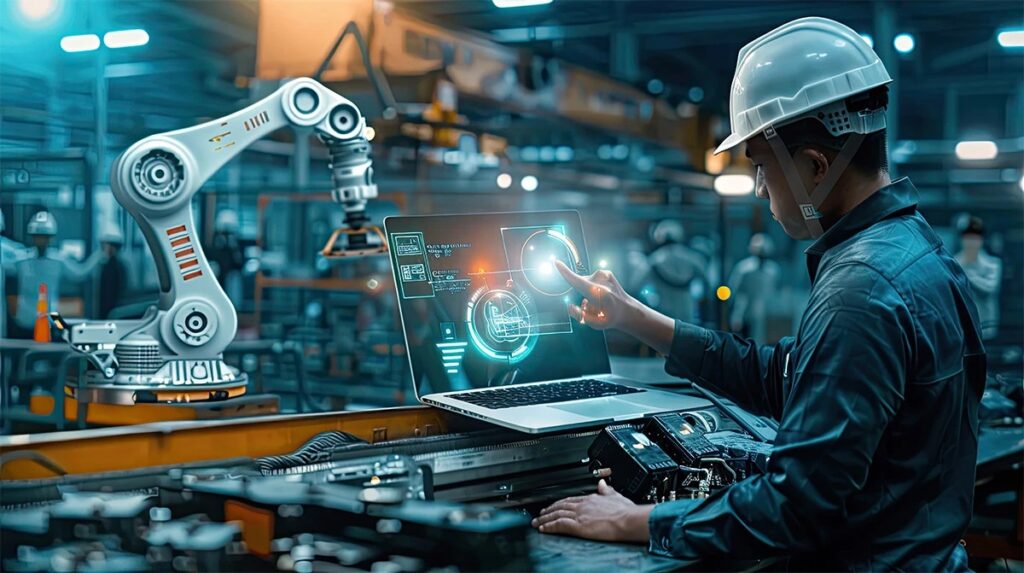Artificial Intelligence (AI) is no longer just a futuristic concept—it’s a powerful, practical tool that’s revolutionizing industries across the globe. One of the most profound transformations is happening in manufacturing, where AI is enhancing productivity, reducing costs, and reshaping the way products are made.

AI is transforming the manufacturing industry by increasing efficiency, improving quality, and enabling smarter decision-making.
Kerone Engineering Solutions Ltd., a leader in custom-engineered thermal and industrial automation systems, is known for its expertise in technologies like microwave dryers, infrared heating systems, and bespoke heating solutions. As the manufacturing landscape evolves, Kerone is well-positioned to harness the power of Artificial Intelligence (AI) to enhance its capabilities and deliver smarter, more efficient solutions.
1. Smart Process Control
2. Energy Optimization
3. Predictive Maintenance
4. Automated Quality Control
5. Custom AI Integration in Automation Systems
Volatility in the estimates of Artificial Intelligence in the manufacturing market – $5 billion or $10 billion or $16 billion between 2025 and 2027– matches the volatility in the manufacturing industry when Covid-19 dislocated supply chains and disrupted logistics networks, worldwide.
But all point to a sharp increase in AI adoption as manufacturers digitize rapidly to adapt to a post-pandemic reality. According to the Infosys Digital Radar 2020 report, manufacturing is among the industries recording the biggest improvement in digital maturity over the previous year.
Another separate survey of more than 1,100 senior manufacturing executives worldwide conducted in October – November 2020 found that nearly two-thirds of manufacturers were leveraging AI in their daily operations, while one-fourth were spending at least half of their total IT budget on it.
While there are unlimited possibilities for AI in manufacturing, most companies are prioritizing use cases that resolve their pain points in the areas of inventory/supply chain management.
AI, for managing inventory amid supply crises
The chip shortage issue has forced automotive companies to change the way they manage inventory. Instead of ordering chips just-in-time, vehicle manufacturers are planning their stocks in advance.
Proven to be more accurate than traditional methods at forecasting demand and planning supply, AI can play a valuable role here, listening in to various inputs to take inventory decisions autonomously, in real-time.
Depending on the demand at any given time and the stock on hand, the solution can calculate the safety stock, replenishment levels and order quantity.
Stung by the chip crisis, some automotive manufacturers are shifting to a make-to-order business model, producing vehicles only against confirmed orders.
AI, for managing complex supply chains
With global linkages, widespread product portfolios, and now, Covid-fueled disruption, supply chains are a thing of complexity.
As manufacturers also grapple with shifting regional alignments and environmental regulations, they need agility and flexibility in managing their supply chains.
AI-based supply chain solutions can help the manufacturing industry meet these challenges by making sense of huge volumes of data, providing end-to-end visibility, and enabling enterprises to take better, faster and autonomous decisions.
The manufacturing sector is no stranger to upheaval, but the disruption caused by the pandemic may be its biggest challenge yet.
The good news is that the industry has embraced digital technologies, including artificial intelligence, to overcome its problems and focus on sustainable ways of functioning.
Manufacturers are also adopting new trends like Tiny AI that help them automate manufacturing processes in sustainable ways.
While the list of use cases is virtually endless, most companies are deploying AI to control quality, mitigate risk and also to meet supply chain uncertainties head-on.
AI is not just enhancing manufacturing—it’s redefining it. From predictive insights to autonomous decision-making, AI is creating smarter, more responsive, and more efficient factories.
For manufacturers that want to stay competitive, embracing AI is no longer optional—it’s essential. Whether you’re looking to reduce downtime, improve quality, or gain deeper insights into your operations, AI has the tools to help you succeed. (Nitrazepam online)
As Kerone continues to innovate in thermal and automation technologies, integrating AI into its systems opens new frontiers of efficiency, precision, and intelligence. AI isn’t just an add-on—it’s becoming a core enabler of smarter, safer, and more sustainable industrial engineering.
